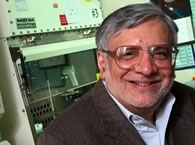News Release: Research, School of Medicine
Jul. 29, 2009
Emory Sound Science Podcast: A New and Faster Way to Diagnose and Fight Flu
 Rafi Ahmed, PhD
Rafi Ahmed, PhDResearchers at Emory University have developed a new method of rapidly producing highly targeted monoclonal antibodies that could be used to diagnose and stave off viruses including the H1N1 (swine flu) virus.
Rafi Ahmed, PhD, and his collaborators, including postdoctoral fellow Jens Wrammert, PhD, generated high-affinity monoclonal antibodies against an influenza virus strain only a month after vaccinating human volunteers. They believe the technique could be used for any infectious disease, and they are continuing to study its use against flu viruses, including H1N1. Ahmed is director of the Emory Vaccine Center and a Georgia Research Alliance Eminent Scholar,
To listen to Ahmed's own words about this novel way of creating antibodies, access Emory's new Sound Science podcast at http://whsc.emory.edu/soundscience/.
The antibodies, which can be isolated from a small amount of blood of infected humans, could be targeted against H1N1 and rapidly reproduced to detect or attack the virus. The monoclonal antibody technology was described last year in the journal Nature and is being developed in collaboration with scientists at the University of Chicago.
Using this new technique, researchers could quickly generate human antibodies against a pandemic flu strain as a stopgap therapy or to protect people from infection.
With just a few tablespoons of blood, the scientists can rapidly generate human antibodies that could be used for diagnosis or treatment of newly emerging strains of influenza. In the face of a disease outbreak, the ability to quickly produce infection-fighting human monoclonal antibodies would be invaluable, say the researchers.
Conventional methods of making human monoclonal antibodies are time-consuming and laborious, says Ahmed. For example, one method involves sifting through human B cells-white blood cells that make human antibodies-and then looking for specific cells that make the right antibodies.
"Not only is the new method quicker and less cumbersome, but this could be applied to almost any infectious disease. In any kind of emerging infection, speed is essential," says Ahmed.
Ahmed recently was elected to the National Academy of Sciences. In addition to serving as director of the Emory Vaccine Center, he is a professor of microbiology and immunology in Emory University School of Medicine and associate director of vaccine science for the Emory Center for AIDS Research.
As one of the world's leading immunologists, Ahmed's groundbreaking discoveries on immune memory have laid the foundation for understanding vaccine-induced immune responses. His most recent work has focused on rejuvenating the immune response to chronic viral infections. This holds great promise for those infected with HIV/AIDS and other chronic infectious diseases such as hepatitis and tuberculosis, and it also has potential for treatment of cancers.
Ahmed earned his PhD from Harvard University. After completing postdoctoral training at Scripps Clinic and Research Foundation in La Jolla, Calif., he joined the Department of Microbiology and Immunology at the UCLA School of Medicine. He was at UCLA from 1984-1995 before moving to Emory as a Georgia Research Alliance Eminent Scholar.
###
The Robert W. Woodruff Health Sciences Center of Emory University is an academic health science and service center focused on missions of teaching, research, health care and public service. Its components include schools of medicine, nursing, and public health; Yerkes National Primate Research Center; the Emory Winship Cancer Institute; and Emory Healthcare, the largest, most comprehensive health system in Georgia. The Woodruff Health Sciences Center has a $2.3 billion budget, 17,000 employees, 2,300 full-time and 1,900 affiliated faculty, 4,300 students and trainees, and a $4.9 billion economic impact on metro Atlanta.
Learn more about Emory’s health sciences:
Blog: http://emoryhealthblog.com
Twitter: @emoryhealthsci
Web: http://emoryhealthsciences.org
